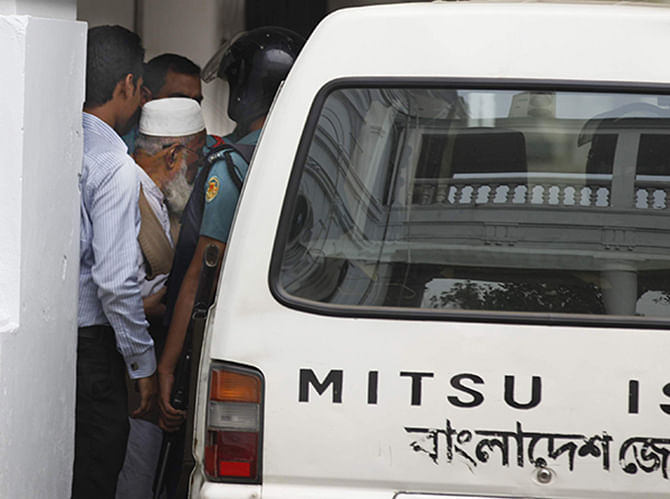Gallows for Subhan
Gallows for Subhan

A tribunal in Dhaka today handed death penalty to Jamaat-e-Islami leader Abdus Subhan on three charges for committing crimes against humanity during the Liberation War in 1971.
The 79-year-old Jamaat nayeb-e-ameer was also sentenced to imprisonment until death on two charges and five years’ imprisonment for another.
- 6 out of 9 charges were proved
- Court awarded death penalty on 3 charges
- Jail until death on 2 charges
- 5 years’ imprisonment for another
While delivering the verdict, Justice Obaidul Hassan, chairman of the International Crimes Tribunal-2, said Subhan is now at an advanced age but it cannot be considered as a “mitigating factor” for reducing the punishment since the gravity of his offences were extreme.
Apart from this, the crimes were committed in 1971 when he was young, the justice said.
Expressing satisfaction over the verdict, Prosecutor Sultan Mahmud Simon said, “We are happy as we have become successful in proving three charges for which Subhan was awarded the death penalty.”
“We also tried our best to prove the three charges in which he (Subhan) was acquitted, but we failed to convince the tribunal,” he said.
VERDICT
Subhan was sentenced to death for one of the most serious charges brought against him for killing around 400 people by the Pakistan army and its local collaborators allegedly under his leadership in several villages of Satbaria union under Sujanagar upazila on May 12.
He was also awarded capital punishment for killing five people and looting and torching of several houses in Sahapur village in Ishwardi of Pabna on May 2 and for the abduction and killing of three named people and several unnamed in Ishwardi on April 17-18 in 1971.
Subhan received imprisonment until death for killing five people and injuring three others at Juktitala village of Ishwardi on April 13 and abduction and killing 18 villagers at Varara of Pabna in May.
Meanwhile, the court acquitted him of three charges. The charges are: Killing and torching of houses at Kulunia and Dogachhi villages in Pabna on May 11, abduction and killing of two people of Dublia Bazar of Pabna in the first week of September and abduction and killing of four people at Betbaria village in Ishwardi at the end of November.
COURT SITS AMID TIGHTENED SECURITY
Amid tightened security in and around the court premises, law enforcers took Subhan to ICT-2 premises in the morning.
Security was beefed up in and around the court premises to ward off violence centering the pronouncement of the verdict.
Transport movement was halted from Doel Chattar to High Court Mazar area since morning in a move to ward off any attempt to create violence by Jamaat.
Soon after Subhan was preduced before the International Crimes Tribunal-2, the tribunal read the summary of the 165-page verdict from 11:16am to 11:52am.
BACKGROUND
The Jamaat leader played a key role in organising the anti-liberation elements in Pabna.
Son of Sheikh Naimuddin and Nurani Begum of Tailakundi village in Sujanagar upazila of Pabna, Subhan was the general secretary of Peace Committee, a collaborating force of the Pakistan occupation army, in Pabna in 1971, according to the prosecution.
Later, he was made vice-president of the committee.
He was the founding ameer of Jamaat-e-Islami's Pabna unit and a Majlish-e-Sura member of the party's central unit during the war, said the prosecution.
Subhan was elected unopposed a member of the National Assembly of Pakistan in 1971. He fled to Pakistan when the war was nearing its end. He rejoined politics after the assassination of Bangabandhu Sheikh Mujibur Rahman in 1975.
He was elected lawmaker from Jamaat in 1996 and 2001, according to a defense counsel.
Law enforcers arrested Subhan on September 20, 2012. After probing the allegations against him for 17 months, the war crimes investigation agency submitted its report to the prosecution on September 12, 2013.
Three days later, the prosecution submitted formal charges to the ICT-1. The court on December 31 last year framed nine charges against Subhan. Later, the case was transferred to ICT-2 for a quick disposal.
The trial in the case was completed on December 4 last year.
Two war crimes tribunals have so far delivered 16 verdicts, while the judgment in another case has been pending with the ICT-1.